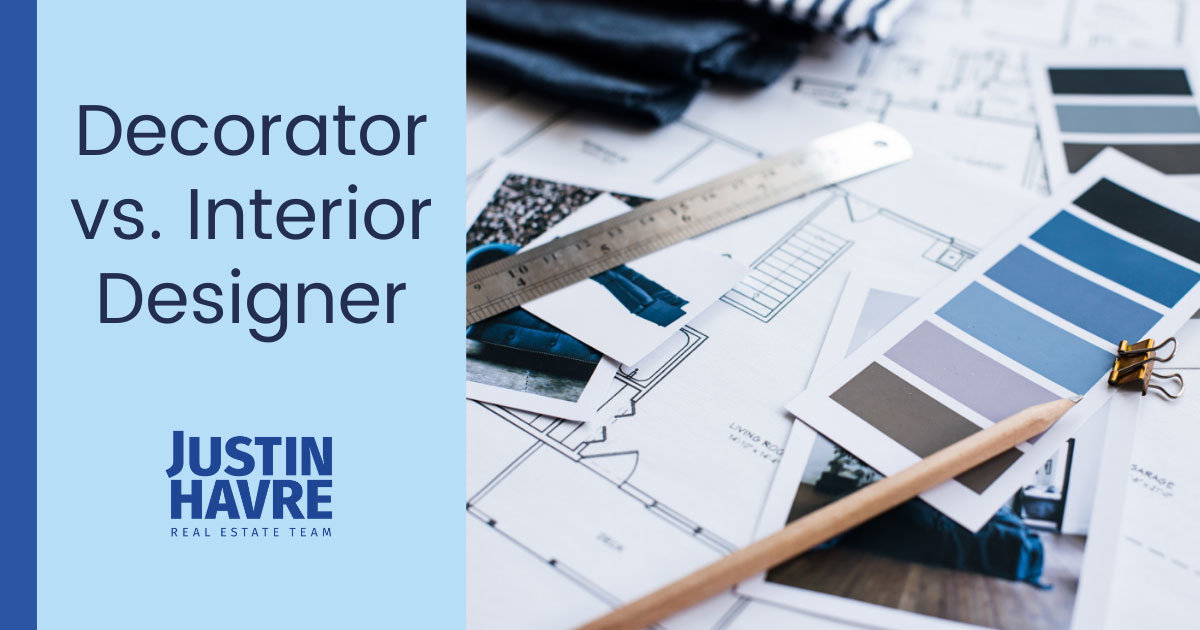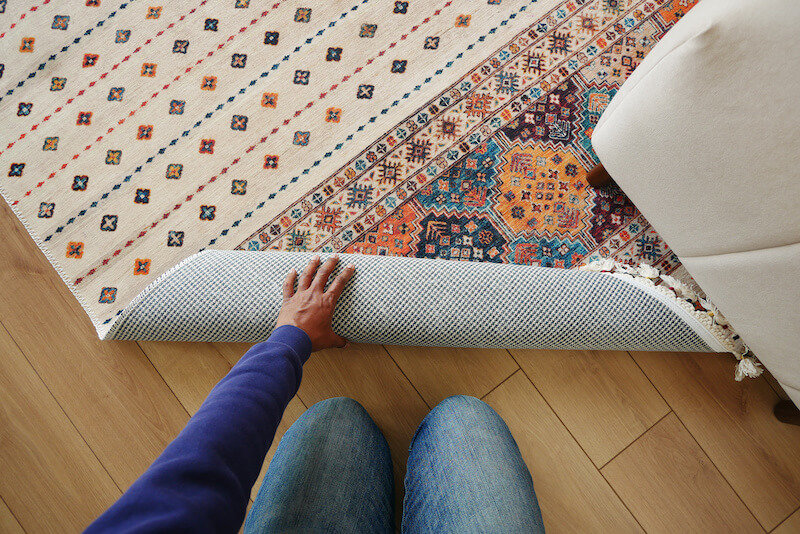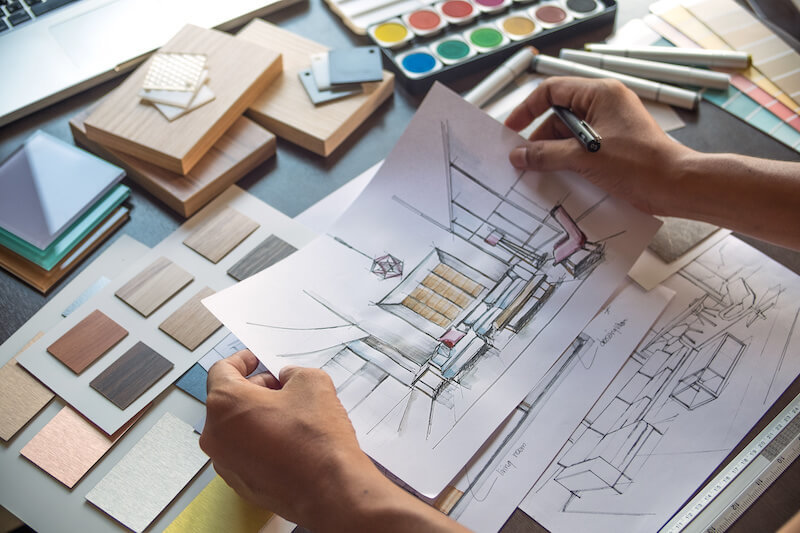
Confused about the difference between an interior designer and a decorator? Many people use these terms interchangeably without even realizing it, so you’re far from alone. While there’s often overlap in skills between the two professions, designers and decorators can be worlds apart. So, what makes them distinct? And how do you choose the right expert for your project?
Interior Designers vs. Interior Decorators at a Glance
- Interior designers and interior decorators are not the same thing.
- Interior designers focus on structural changes and functional spaces. These roles require formal education and certifications.
- Decorators specialize in aesthetics without altering structures. These roles don’t require formal training.
- Designers typically charge higher fees due to their comprehensive project involvement and expertise.
Understanding Interior Design
Interior designers are more than just decorators—they’re skilled professionals who plan, design, and furnish living spaces to improve their clients’ daily habits and lifestyle.
Unlike interior decorators, who focus primarily on aesthetics, interior designers take a comprehensive approach, addressing structural issues and creating functional spaces.
An interior designer’s work can involve selecting colours, shopping for furniture, and creating aesthetically appealing rooms within various types of spaces. However, the role also encompasses developing new room layouts and using software to visualize the final design for clients.
Many interior designers also handle projects that require significant structural changes, such as modifying floor plans and integrating new architectural elements. Their training and expertise ensure that the spaces they design are not only beautiful but also functional and safe. Building permits, ACA accessibility, code compliance, and fire safety are all part of interior design.
Education and Qualifications
Did you know that becoming an interior designer requires a substantial investment in education and training? Many interior designers hold a bachelor’s degree in interior design or a related field, and while that’s the industry standard, some interior designers enter the field with an associate degree.
This coursework typically covers a wide range of subjects including colour theory, computer-aided design (CAD), space planning, furniture design, fabric selection, and building codes.
Beyond a bachelor’s degree, many interior designers also pursue additional certifications and qualifications to enhance their skills and credibility. For instance, the National Council for Interior Design Qualification (NCIDQ) exam is a rigorous assessment of a designer’s knowledge and competence in the field. In almost all U.S. states and Canadian provinces, passing this exam is required in order to become a licensed interior designer.
All told, interior design can be a surprisingly complex profession. You’ll want to rely on someone who’s well-equipped to tackle the job at hand, so be on the lookout for designers who belong to professional organizations.
Scope of Work
The scope of work for interior designers can be quite broad, covering a wide range of projects.
Interior designers handle projects that focus on functional improvements, such as enhancing the layout of a space to improve flow and usability. Whether it’s a residential home or a commercial building, these experts are adept at creating spaces that are not only aesthetically pleasing but also highly functional.
Need to redo your kitchen so it’s actually functional? Call a designer, not a decorator. Want a home theatre? A designer will consider everything from acoustics and viewing angles to how to keep guests from tripping in the dark. Planning a home addition? Bring a designer on board to help you figure out the best way to make it flow with your existing home.
By working alongside architects, builders, and other industry specialists, interior designers aim to make sure that every aspect of the space is meticulously planned and executed.
Exploring Interior Decorating

Now that you’re up to speed on interior designing, how does it compare to interior decorating? While similar at times, this profession is all about enhancing a space’s aesthetic appeal.
Interior decorators work with elements like wall art, furniture, and accessories to focus on making spaces visually appealing and cohesive—without making structural changes. This often means selecting colour schemes, arranging furniture, and choosing decorative items that reflect the client’s style, all while considering interior decoration best practices.
One of the key advantages of hiring an interior decorator is the speed at which they can complete projects. Because they do not need to deal with structural changes or complex planning, decorators can often transform a space in a matter of weeks.
Some interior designers also take on an interior decorator’s decorating roles, blending their responsibilities to offer a comprehensive design service.
Skills and Experience
Interior decorators typically do not require a formal degree to practice their profession.
Many decorators acquire their skills through on-the-job learning, honing their eye for design and their ability to create cohesive spaces. This practical experience is often reinforced with a portfolio of freelance work, which they use to attract clients and gain positions.
Decorators often work independently or for decorating firms, and some may run their own businesses specializing in residential homes or commercial spaces. This flexibility allows them to adapt to different styles and preferences, making them a versatile choice for clients.
Project Focus
Interior decorators primarily focus on projects that enhance the aesthetics of a space without the need for structural changes. This work can involve directly ordering, purchasing, and arranging items such as furniture, paintings, and rugs or carpets to create inviting, cohesive spaces.
A decorator can pinpoint the best home office layout and decor to keep you focused, or the exact kind of lights to give a room the vibe you’re looking for. Need to make a room feel warm and cozy? A decorator can make it happen within your existing space.
Whether it’s a single-room makeover or a whole-house redecoration, decorators bring a keen eye for design and a talent for selecting the right pieces to create an aesthetically pleasing environment.
Comparing Costs: Interior Designers vs. Decorators
When it comes to costs, there can be huge differences between hiring an interior designer and an interior decorator. There are also huge differences depending on the scope—and complexity—of the project.
No matter which route you take, you’ll want to get multiple bids.
Different designers and decorators will have different pricing structures. The most common ones are:
- Paid by the hour
- Flat fee
- Percent of project
You may also see less common fee structures, like:
- Paid by the square foot
- Paid by the room
- Cost-plus (a decorator buys furnishing/materials at cost and charges a set markup)
When you’re looking at hourly rates, they may seem comparable. But an interior designer’s job typically takes more hours because they’re doing both structural design and decorating.
The overall range of fees for hiring either a designer or a decorator is typically between $1,500 to $15,000 or more, depending on the specific requirements and scope of the project.
Factors Influencing Cost
Several elements influence the total cost of hiring an interior designer or decorator.
- The size of the project is one of the most significant factors, as larger projects generally require more time and resources, leading to higher costs.
- The duration of the project also plays a role, with longer projects incurring more expenses. You’ll want to avoid delays as much as possible.
- The complexity of the project, including the use of high-end materials and intricate design elements, can also drive up the overall cost.
While you may be hesitant to hire a professional, working with an interior designer can lead to significant savings by preventing costly mistakes in furniture and design choices.
Ultimately, your budget and specific requirements will determine the total investment needed for the project.
Choosing Between an Interior Designer and a Decorator

Deciding whether to hire an interior designer vs. a decorator often boils down to the complexity of the project and the desired outcomes.
Say you want to switch an older home to an open floorplan. An interior designer is the right choice, as their expertise in space planning and structural modifications ensures that the project will be executed safely and efficiently.
Decorating a commercial space, like a store, office, or a hospital? You’ll want a designer. These spaces have to adhere to strict safety regulations like ACA requirements, and a designer’s been trained to keep these things in mind. (Healthcare spaces are a niche of specialized knowledge on their own.)
What about projects that focus primarily on aesthetic improvements, such as updating furnishings or decorating an empty new construction home? An interior decorator may be a better choice. They can source ideal furniture and transform spaces without altering the physical structure, making them ideal for quick and cost-effective makeovers.
Evaluating Portfolios and References
As you consider who you want to spearhead your project, take a look at portfolios and references—they’ll help you narrow down your list and hire the right professional.
The reputation of the designer or decorator can significantly impact pricing, and reviewing their past work will provide insight into their style and capabilities. Just because they’re talented in certain areas of focus doesn’t mean they’ll be the best match for your needs.
As such, you should feel confident that their portfolio aligns with your vision and that they have positive references from previous clients.
Collaboration and Work Arrangements
Whether you choose to hire an interior designer or a decorator, collaboration and communication will be key building blocks for a successful project.
Interior decorators may choose to work independently or in smaller teams, focusing solely on aesthetic enhancements. While they may not require the same level of collaboration as designers, effective communication with clients and other stakeholders is still essential.
Team Collaboration
Interior designers often work closely with architects, builders, and other specialists to balance structural integrity with aesthetic appeal. This collaborative approach ensures that all aspects of the project are meticulously planned and executed.
Decorators may choose to work alone or in smaller teams for their projects. This flexibility allows decorators to focus on aesthetic enhancements without the need for extensive coordination with other professionals.
Client Interaction
As a client, you should expect dialogue throughout your project to help address any changes that might come up and ensure the final result is to your liking. This ongoing interaction allows designers and decorators to accurately capture your preferences and requirements.
Why Hire a Designer or Decorator?

Many homeowners think they can DIY their home’s design and don’t see the point in paying a professional. And some can. Others get weeks or years and thousands of dollars into the project only to realize they hate the end result, they still can’t pinpoint what’s wrong, or that this whole thing was way harder than they expected.
There are two primary benefits of hiring a professional:
- Their expertise lets them get the design right the first time
- You outsource the time and energy of making everything come together
Some clients have the skill but not the time to design and execute a room. Others have the time but not the skill. Still others have neither.
Even if you have a perfect vision in your head, do you have the hours to spend researching each individual product? Do you know all the right questions to ask to make sure it’s right for your space and needs?
Professionals are well-practiced at sourcing furniture and materials. They don’t just run out to the local bedding store or furniture mart to pick from the selections. It may be that the perfect item isn’t even on the market—it might come from the decorator buying fabric from one vendor, a furniture piece from another, and having it upholstered by a contractor they know.
Hiring a professional interior designer or decorator can make all the difference. Their expertise and advanced skills lead to spaces that truly reflect your style and needs.
And while there’s a price to pay for quality work, pros can also save you valuable time.
Interior designers and decorators streamline the project management process, overseeing everything from concept to installation. This minimizes delays and ensures that projects are completed on time and within budget, allowing you to focus your attention elsewhere.
Professional interior designers possess a trained understanding of aesthetics and functionality. Their ability to foresee potential issues and plan an efficient timeline ensures that projects run smoothly and meet deadlines.
Better yet, by leveraging relationships with suppliers and contractors, interior designers can even expedite project timelines and negotiate better pricing for materials.
As a client hiring a professional to create a fully realized space, you can expect creative and technical solutions without the unnecessary stress and complications of a DIY project.
Choose the Right Expert to Bring Your Vision to Life
Whether you end up going with an interior designer or you prefer to hire a decorator, choosing the right professional for your space can make a world of difference.
Interior designers tend to bring a comprehensive approach, addressing structural and functional aspects, while decorators focus on enhancing aesthetics. Understanding the scope of their work, qualifications, and costs will help you pick the right person who can realize your vision.